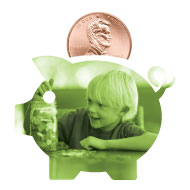April is Credit Union Youth Month – a time when credit unions offer special rates on youth savings accounts and other products that help young people get a financial head start in life.
In recognition of the event, Delta Community will be giving away prizes and educational materials in our branch locations and at select elementary schools. We also provide sound financial advice and timely tips to help teach children how to save money and, especially during Youth Month, we want them to understand why it is important to save money now – while they have the advantage of time.
Most of us understand how savings funds can help during financial emergencies. But they can also empower people to take advantage of unexpected opportunities. Additionally, in the process of learning to save, children learn important lessons about self-discipline and responsibility. Most important, though, saving money early on allows children to build wealth much faster than they can simply earn it.
Teach your children that:
If they spend all the money they make, it will never have a chance to grow.
- Financial advisors say children as young as 11 can begin learning the concept of compounding interest, which allows them to earn interest on both the principle they save, and the interest it earns.
- Explain it in specific numbers. For example, if your children save $100 a year, starting at age 14, they will have $23,000 by age 65. But if they begin saving at age 35, they will have only $7,000 by age 65. Use online tools such as the Delta Community Savings Calculator or Investor.gov to illustrate how much money is generated by compounding interest.
Developing a saving habit teaches self-discipline and responsibility.
- When young people learn to save, they learn other important life lessons. One study found that people who are conscious of money typically strive to be more self-sufficient than people for whom money is not a priority. Teach your kids how a healthy nest egg enables them to live the way they want without being dependent on others.
- That nest egg may also allow them to invest in charities that are important to them, or to help relatives or friends who need financial support. Being able to help others is a great achievement.
- Learning to save money in youth establishes important habits they may not have the luxury of cultivating later, when adult responsibilities – and expenses – may seem overwhelming. Young people may argue that they have less money to work with. But they also have much less financial responsibility. As adults, they will have a longer list of bills to pay, people to support, and other financial obligations.
Saving money helps them prepare for the future – whatever it may bring.
- A well-funded savings account helps protect against unexpected crises. Adults may fear serious setbacks, like job losses or catastrophic medical bills. But even young children can understand the importance of preparing for age-appropriate emergencies, such as repairing a neighbor’s baseball-damaged window.
- A savings account also gives them the latitude to take advantage of good opportunities. If friends organize a last-minute trip to the movies, kids who have set aside a little cash can afford to go along. Saving money for a rainy day is absolutely critical, and setting aside money for a sunny day is also important.
Whether your kids are 5, 15 or 25, we hope you will use Youth Month as a springboard for discussions about saving money. While money may not buy happiness, studies show putting away savings can improve a person’s confidence, peace of mind and quality of life. What better gift to give our children than that?



